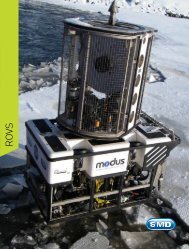WORKING AT HEIGHTS - Wind Energy Network
WORKING AT HEIGHTS - Wind Energy Network
WORKING AT HEIGHTS - Wind Energy Network
Create successful ePaper yourself
Turn your PDF publications into a flip-book with our unique Google optimized e-Paper software.
BUSINESS DEVELOPMENTManagement MattersIn the last of the workshop series,created by of Renewables <strong>Network</strong>to help businesses prepare forthe demands of the offshore windenergy supply chain, the subject ismanagement. Here John Britton,Director of Renewables <strong>Network</strong>Ltd, discusses the critical, but oftenmisrepresented role of management.Many things have been published overthe years that have simply served toconfuse managers by mixing styleand function as if they are the samething. In this workshop the focus is onfunction, leaving the question of styleto the individual. The only style thatwill work is the one that is natural toyou.LEAD OR MANAGE?This is the first question that needs to beresolved. One hears a number of onelinersthat are designed to capture theessence of each.“Leading is transformational, managing istransactional”“Leaders are inspirational, managers aretechnical”These statements sound catchy, butthey confuse function and style. Oneof my favourite books on the subject is“Burn! 7 Leadership Myths in Ashes”by Mitch McCrimmon. In it he clarifiesvery effectively that leadership andmanagement are distinct roles, both ofwhich can be accomplished in a rangeof styles. For him the role of leadership isto set a new agenda for the team. Thismakes the role more than innovation,there are plenty of innovators who don’tmanage to sell the change of agenda towhich their innovation opens the door.A leader has to sell the change to the‘agenda setters’. As such a leader canexist anywhere in an organisation, not justat the top.The role of management is to executethe agenda. The agenda can be one ofincremental improvement of performanceto maintain a ‘no change’ strategy, or itcan be to execute exciting and significanttransformation triggered by a newstrategic vision. The specific challengesmay be different, but the role is the same –to execute the agenda.• Are these roles mutually exclusive?No, a manager can also be a leader.• Are these roles mutually dependent?No, a leader can emerge from thelaboratory or from the sales force tosell a new concept, never having hadany management experience at all.Also a manager can be a superbmanager without ever being a leader.CHANGE MANAGEMENTThere you have it. The function thatis the subject of countless seminarsand hundreds of books is changeMANAGEMENT, not ‘change leadership’.This whole topic embraces the two roles,but the far more significant functionin the achievement of change is themanagement role of executing the changeagenda. John Kotter is, perhaps, a betterknown author than Mitch McCrimmonand his book ‘Our Iceberg is Melting’co-authored with Holger Rathgeber hascertainly achieved book of the monthstatus in management circles. The clarityKOTTER1 Create a sense of urgency – help others to see the need forchange and the importance of acting immediately2 Pull together the guiding team – make sure there is a powerfulgroup guiding the changewith which Kotter describes the essentialsteps required to secure organisationalchange is very helpful for every manager.3 Develop the change vision and strategy – clarify how the futurewill be different from the past4 Communicate for understanding and buy-in – make sure asmany others as possible understand and take ownership of thestrategyThese steps are:Step 1 is exclusively the role of leadership;this is where the change concept is soldto the agenda-setters. Steps 2 and 3 willcertainly involve the leader to ensure theconcept is not diluted or hi-jacked byanother influence, but it is in these stepsthat the management of change beginsto be organised. From there on in the roleis exclusively management. WheneverI check my own conviction by readingthrough this list I get questioning thoughtssuch as “Step 5: Empowering others –that sounds like leadership”. But I soonrealise that I am thinking about style ratherthan function, I am thinking about inspiringand then charismatic communication.Empowerment of others (or delegation)is a management function and can be asuccess in a number of styles, just thesame as it can be a miserable failure in anumber of styles, but more of that later.5 Empower others to act – remove all the barriers so that those whoare committed to the change can succeedMcCRIMMONLEADMANAGE/LEADMANAGE/LEADMANAGEMANAGE6 Produce short term wins - create some visible, unambiguoussuccesses as soon as possible.7 Don’t let up – be relentless in achieving change after change untilthe vision is a reality8 Create a new culture – hold on to the new ways of behaving untilthey become strong enough to replace the old traditionsMANAGEMANAGEMANAGE20www.windenergynetwork.co.uk
















